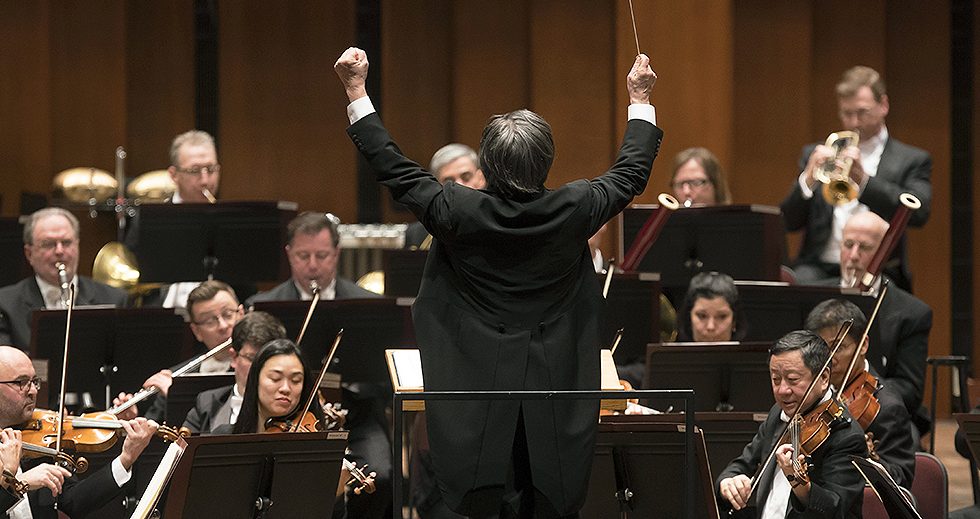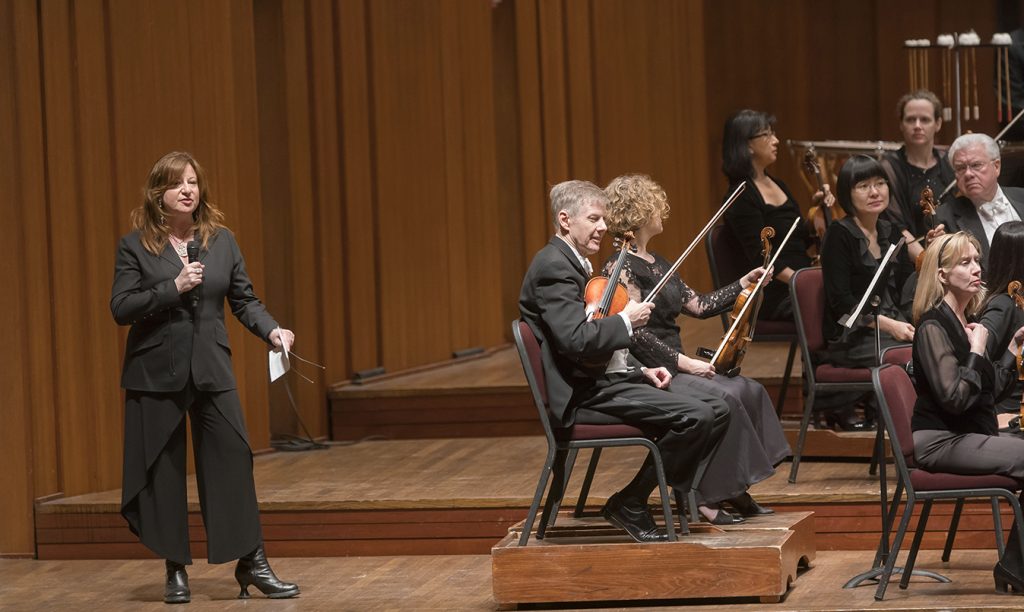
WASHINGTON, D.C. — It was their 350th concert together since Riccardo Muti stepped before the Chicago Symphony Orchestra in 1973 as a young maestro of 31, but that milestone was only one of a dizzying number of reasons to celebrate on a night of over-the-top happiness in the nation’s capital on Feb. 7.
Washington Performing Arts, a longtime presenter of visiting orchestras, had been lobbying for more than a decade to get the CSO back on its subscription season at the Kennedy Center. When the CSO did return, for its first engagement here since 2005, and for its first-ever visit with Muti at the helm, it was with the fresh news that he had agreed to a tenure extension by two years, through August 2022.
“They are sounding good, yes?” said the maestro, who emerged exultant from his dressing room into the backstage crush, readily acknowledging a well-wisher’s idea that even for him, and even for this orchestra, it had been an exceptional night. Among the VIPs to say hello was Armando Varricchio, Italy’s ambassador to the United States.
The musicians had brought with them the closest thing orchestra and maestro have to a talisman — Brahms’ Symphony No. 2, a work they could doubtless perform from memory should the need present itself, so many times have they performed it, in so many places, around the world. To sweeten the challenge, the CSO added the East Coast premiere of many words of love, a recent work by Samuel Adams, 32, one of the CSO’s Mead composers-in-residence.

Jenny Bilfield, president and CEO of Washington Performing Arts, addresses the audience before the CSO’s concert at the Kennedy Center. | ©Todd Rosenberg 2018
They did all this without rehearsal or sound check, in a hall they had never set foot in together. In fact, the concert went so well, with so many ovations, that Muti decided to end the event after the Brahms symphony, without an encore. The maestro, clearly pleased, brushed away the difficulty of what they had done. “I know this hall since it first opened,” he said of the compact 2,465-seat shoe-box formation, a handsome interior with a bright Cyril Harris acoustic, seven chandeliers, and a stage area lined with wood and backed with a pipe organ’s shiny ranks.
Muti recalled leading a Philadelphia Orchestra concert at Kennedy Center in the early ’70s, when the hall was still new. And the maestro well knows that type of elongated concert space, a modern evocation of the principles of Vienna’s Musikverein (where he frequently conducts), with its classical proportions, acoustical warmth and pronounced capacity for delicacy and clarity, characteristics that fit him hand to glove.
The Washington performance was a one-nighter at the onset of the CSO’s East Coast Tour 2018 that includes visits to New York’s Carnegie Hall and Chapel Hill, N.C., as well as the warmer climes of West Palm Beach and Naples, Fla. After the concert, Washington Performing Arts president and CEO Jenny Bilfield said that in survey after survey, their patrons “were continually reminding us they’d always love to hear the Chicago Symphony,” yet it has taken more than a decade to try to get the orchestra back.
“Between scheduling, and tour routing, and the availability of the concert hall, which belongs to the Kennedy Center and is booked pretty heavily — and our commitment not to cannibalize other efforts by, for example, presenting two Mahler symphonies by different orchestras in a single week — it has taken a long time,” she said. “But it worked out at last.”
The effort was personal for Bilfield; she had gone to school University of Pennsylvania in the ’80s, when Muti was music director of the Philadelphia Orchestra, and she was able to take advantage of the $5 student tickets that were available for Friday matinees. “I rearranged my schedule to get downtown and wait on line to sit at the very top of the Academy of Music,” she recalled. “I was a composition student at the time, and I went to every single concert.”
Bilfield did not meet Muti face to face as a student, but she vividly recalled the orchestra exposure as formative: “We’d sit up there and debate the performances – I heard a massive amount of music that way. I even wrote a profile of Muti for our student newspaper at the time. It was an unforgettable experience to become part of that community, getting to know the staff a little bit, being allowed with other student regulars to go in, you know, through the side door.”
Onstage before the concert, Bilfield made special mention of the regional premiere of Samuel Adams’ work, a CSO commission, which she said was indicative of “the Chicago Symphony’s sustained commitment to contemporary music, particularly the work of living composers,” and the prominent role that these composers are encouraged to play within the organization.
“How exciting it is to be bringing your own composer on tour with you?” she exclaimed to the crowd. Indeed, the orchestra is actually showcasing two composers on this tour. Jennifer Higdon’s Low Brass Concerto, barely a week old, will be introduced at Carnegie Hall and points south by the four CSO veterans who premiered it in Chicago — trombones Jay Friedman and Michael Mulcahy, bass trombone Charles Vernon and tuba Gene Pokorny — as the tour continues.
Publisher of and editor-writer for the theater and arts website Chicago On the Aisle, Nancy Malitz is a longtime contributor to many publications, including the New York Times and the Washington Post.
TOP: Riccardo Muti leads the Chicago Symphony Orchestra at the Kennedy Center for the Performing Arts, the first stop of their East Coast Tour 2018. | ©Todd Rosenberg Photography 2018